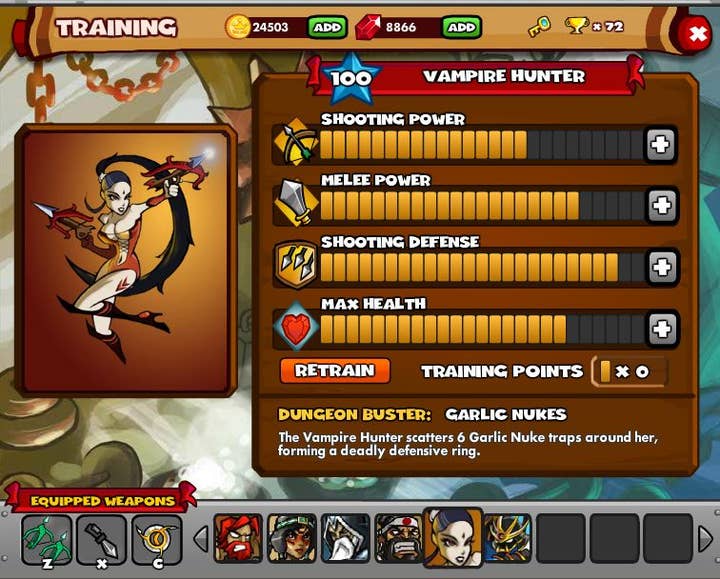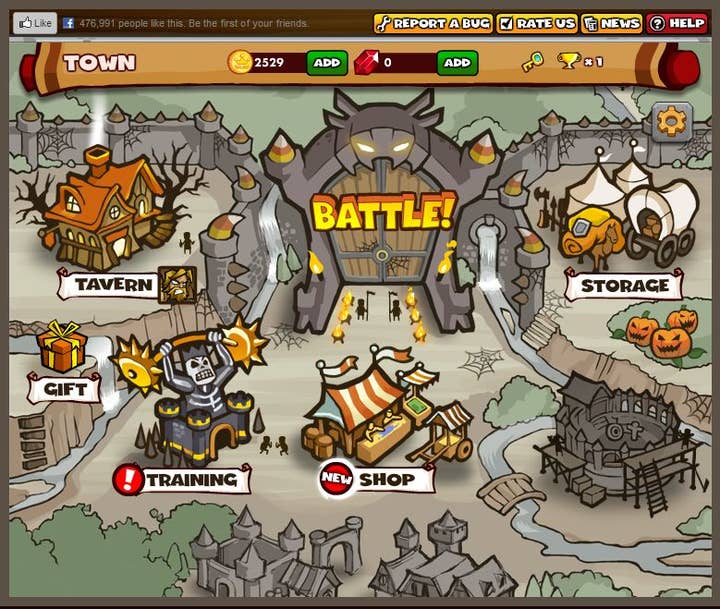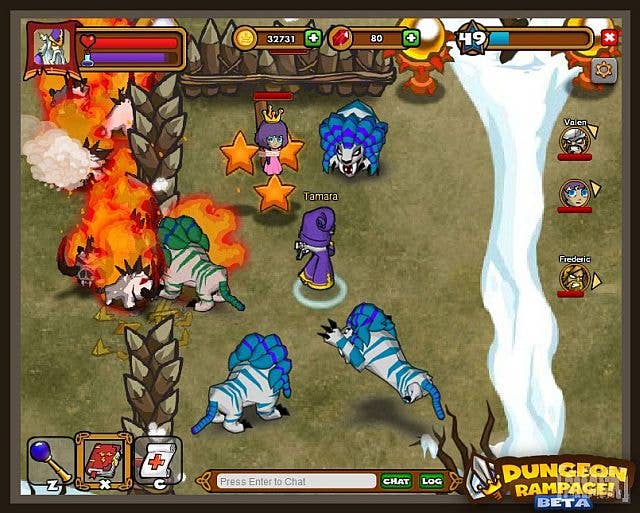Facebook game makers: "Ignore the audience at your peril"
Rebel Entertainment CEO Mike Goslin talks about the changing nature of Facebook games and how to find and keep players
Rebel Entertainment's action RPG Dungeon Rampage has brought arcade-style RPG action to Facebook and Kongregate, and it's one of the games that's been changing the idea of what Facebook games are like. Mike Goslin is the general manager or Rebel Entertainment (owned by Barry Diller's IAC), and he recently spent some time talking with GamesIndustry International about the game and Rebel's plans for the future.
"We've been live since September, and really gotten some traction with the audience," Goslin said. "We've experienced a lot of organic growth and have been getting a lot of critical acclaim from the community. We're pretty proud of how it's been doing, and feel like it's a good statement of what we can do going forward with future titles."
The game is currently ranked in the 200s on AppData, and Goslin provided some specifics on the game's numbers. "We're approaching 8 million accounts created," Goslin said. "The Facebook stats are between 2 and 2.5 million monthly active users (MAU), and we're getting over 200,000 daily actives on a typical day. We're happy with that, it's a very engaged audience. There are bigger games out there, but we like our audience, they're really into it, they play a lot. They're giving us confidence that we're on the right track with what we're doing."
"We take a lot of cues from our audience... You can't let them design the game, but ignore them at your peril"
Mike Goslin
While Dungeon Rampage does not have the huge audience of the top Facebook games, Goslin does feel the game is indicative of what kind of games are popular these days, and how the market is changing. "I think what's happened more broadly is that midcore games have started to emerge as a category," said Goslin. "It's a reflection of the growing acceptance of the platform as a place for gamers to play. This type of game, an action game that's fun and deep and harkens back to the arcade style of game play, it's showing there is a place for these kind of games."
A midcore game can draw its audience from other platforms, or by converting casual gamers to this kind of game play. "I'm sure it's a little bit of both happening," said Goslin. "People who are discovering games are moving up the stacks, so to speak. They're starting off with more casual things then they're getting into it and seeking our deeper experiences. I think when you're talking about a platform like Facebook, gamers were there all along. They just weren't playing games on the platform. It's not that they're moving off of other platforms; it's that gamers like to play games wherever they happen to be. There just wasn't anything for them before the emergence of games like ours in the recent past."

The audience has been leading Rebel in different directions, in terms of adding things to the games. "We take a lot of cues from our audience," Goslin said. "You can't let them design the game, necessarily, but ignore them at your peril. Particularly when the business model is free-to-play, you have to constantly engage them and re-engage them. They're not committed to you in any sense, the way they would be if they paid money up front or if they were paying a recurring subscription. You definitely have to listen to them."
Goslin described some of the ways Rebel involves the audience with the development of the game over time. "If we have a few things we are working on we can let them vote and see which one they want us to do first. We've done that frequently, and it turns into an event," Goslin noted. "The end goal is really to make the players and the community feel like they own the game. If they feel ownership, then they've got skin in the game and your product will have legs."
The audience can surprise the developers with their choices, as Goslin recounts. "It's a humbling experience. We think we know everything, and then we go out there and people don't use it the way you intend, or they latch onto stuff you didn't even think about. For example, we'll design a few characters, and we'll have our favorite, and we'll think that the players will pick ours. They frequently surprise us and pick something else."
"Our best-selling, highest monetizing items are things like heroes that are functional, durable, and also look cool and convey some kind of status"
Mike Goslin
Like many companies, Rebel has found that players can blaze through content very quickly. "Sometimes people will power through it faster than you could ever imagine," Goslin said. "Even though we've been through this multiple times they still always surprise me how fast they can consume content."
Rebel has been tweaking the game play in response to user behavior. "People will play some of our dungeons over and over again because they're efficient ways to farm gold," Goslin explained. "One of the ways we're reacting to that is building special levels that are very efficient at collecting gold, which I think is more fun. If they're repeating a level over and over again just because it's the most efficient one, it may not be very fun for them so you're taking away some of their enjoyment. If that's something they want to do, we'd better provide a fun way to do it, or eventually they're going to get tired of our game."
Rebel's constant work on the game seems to be paying off with good retention, according to Goslin. "We're seeing very good retention," Goslin noted. "Over half of the people come back after the first day. One of the unique things about our game is that it's almost fifty percent that come back after this first month, and when you talk about six or even nine months (counting people from the beta) it's above ten percent. So we've got a very long tail, and we're very proud of the fact that we've held onto people for so long."

Free-to-play games usually offer a variety of virtual goods for monetization, and Dungeon Rampage is no exception. "Our best-selling, highest monetizing items are things like heroes that are functional, durable, and also look cool and convey some kind of status,"Goslin said. The monetization rate is about what Rebel expected. "I think we're doing pretty well. That's where we can continue to improve, and we continue to invest energy in improving that."
What's the next step for Rebel? "We're very excited about mobile," Goslin said. "Especially watching over the holidays the growth of tablets in particular, it's very exciting to us. Gamers have already started to see it as a viable platform, and I think it's a great environment for us to go into. This is the fastest growing pond right now, so we're putting a lot of our attention there. We intend to bring Dungeon Rampage to mobile, and our future titles will also be multiplatform but perhaps with the centerpiece being tablets."
The possibility of moving players from Facebook on to mobile has not escaped Goslin. "One of the nice things about being multiplatform is we can do that in a viable way. When you're talking about a midcore/casual game, it's nice for them to be able to play on their phone, at home on their tablet or at work."
Games are becoming the new coffee break at work. "A lot of people are checking in on these games at work. At work it's hard to whip out your phone or your tablet, but if you can play it on your PC as well that kind of fits in with your day a little better. The reality is, for better or worse, a lot of these Facebook games are being played at work by adults," said Goslin.

